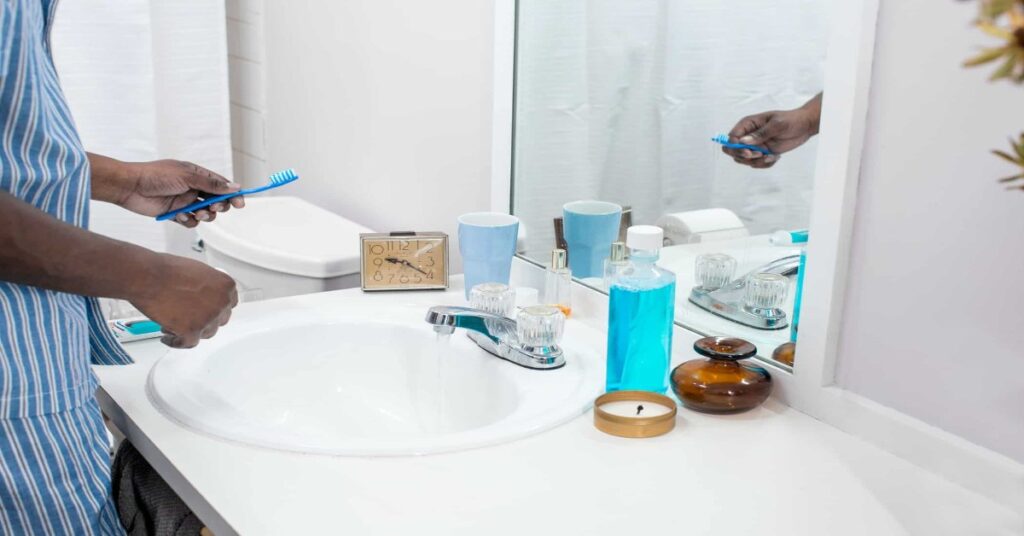When the water in your bathroom sink starts draining slowly or not at all, it’s a frustrating problem that can quickly escalate into a major headache. A clogged bathroom sink drain is an issue that many homeowners face. This article will explore the causes of a clogged bathroom sink drain, the potential risks they pose, and why it’s essential to call a plumber for a professional fix.
Table of Contents
The Anatomy of a Bathroom Sink Drain
Your bathroom sink is equipped with a drainpipe that connects to the sink’s basin. This drainpipe is designed to carry away used water and debris, preventing them from accumulating in the sink. The water then flows through the drainpipe and into your home’s plumbing system, eventually making its way to the sewer or septic tank.
Common Causes of Clogged Bathroom Sink Drains
Many things can make your bathroom sink drain get clogged. Knowing what they are can help you stop it from happening again:
Hair and Soap Residue: Over time, hair and soap residue can accumulate in the drainpipe, creating a blockage. This is one of the most common causes of slow-draining sinks.
Foreign Objects: Sometimes, small objects like jewelry, toothpaste caps, or even debris from broken drain stoppers can accidentally make their way into the sink’s drain, causing an obstruction.
Buildup of Grease and Toothpaste: Grease and toothpaste may seem harmless. But when they accumulate in the drainpipe, they can form a sticky barrier that traps other debris and slows down the flow of water.
Mineral Deposits: In places with hard water, minerals can collect in the pipes, making the water passage narrower.
Corroded Pipes: Over time, pipes can corrode or develop rust, leading to irregularities in the pipe’s inner surface. These irregularities can catch debris and lead to clogs.
The Risks of Ignoring a Clogged Bathroom Sink Drain
While a slow-draining sink may not seem like a significant issue, ignoring it can lead to more severe problems:
Worsening Blockage: What starts as a minor clog can quickly escalate into a major blockage, making it even more challenging to fix.
Unpleasant Odors: Stagnant water trapped in the drainpipe can develop foul odors, making your bathroom an unpleasant place to be.
Water Damage: When a drain is blocked, water can back up and flood the sink, which might damage the countertop and the area around it.
Health Hazards: Water that sits still for too long can also become a place where bacteria and mold grow, and this can make you and your family ill.
Increased Utility Bills: When water can’t flow freely through a clogged drain, you may find yourself using more water to clear the sink, leading to higher water bills.
Why You Should Call a Plumber
While there are DIY methods for unclogging sinks, it’s often best to call a professional plumber. Here’s why:
Expertise: Plumbers are experts who can figure out why your drain is blocked and know the best and safest way to fix it.
Prevention: A plumber can identify underlying issues that may lead to future clogs and offer solutions to prevent them.
Safety: Chemical drain cleaners can be harmful to your pipes and the environment. Plumbers use safe and eco-friendly methods to clear clogs.
Efficiency: Professionals have specialized tools and equipment to quickly and effectively clear clogs, saving you time and frustration.
Long-Term Solutions: While DIY methods may provide temporary relief, plumbers can provide long-term solutions to prevent future clogs, saving you money in the long run. A clogged bathroom sink drain can disrupt your daily routine and lead to more significant issues if left unaddressed. While there are DIY methods to clear minor clogs, calling a professional plumber is often the safest and most efficient solution. Don’t let a clogged sink drain ruin your day – call a plumber and enjoy a smoothly functioning bathroom once again.
Related Articles:
Access Panels for a Modern Lifestyle
How Floor Access Doors Elevate Home Accessibility and Convenience


